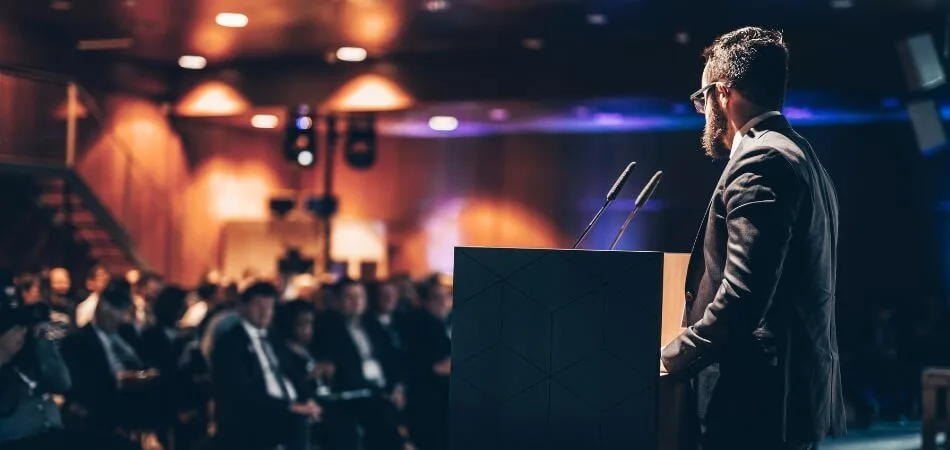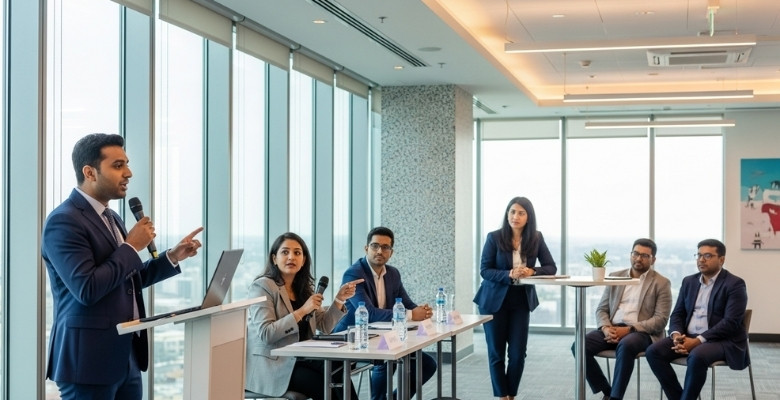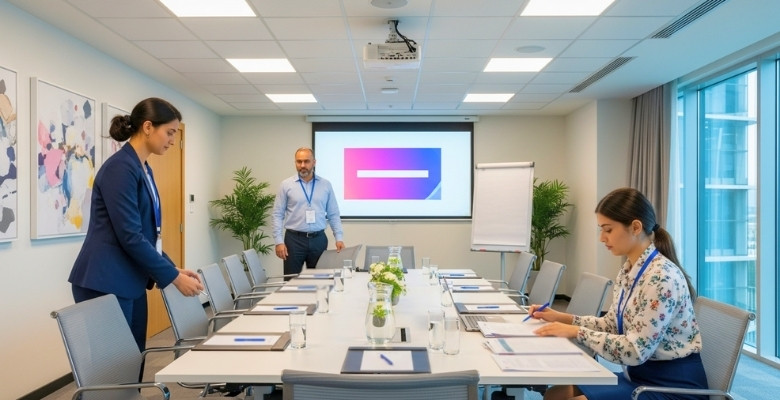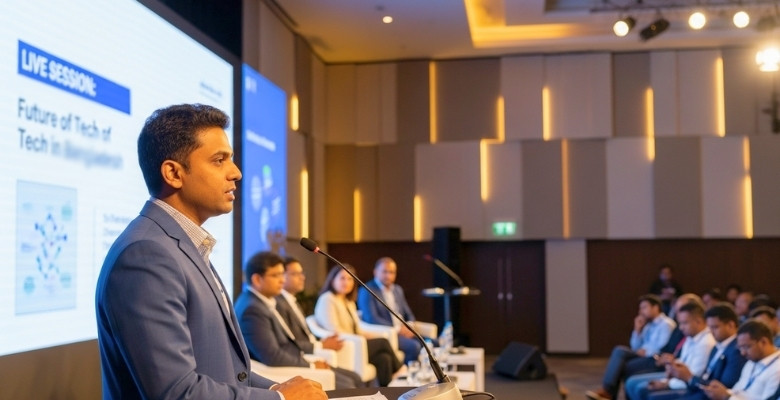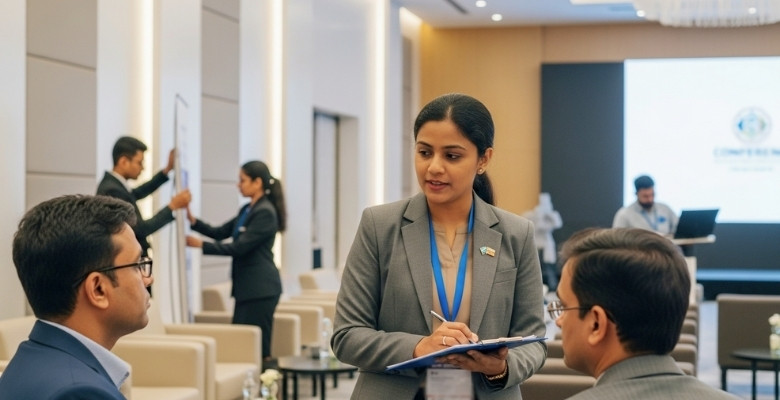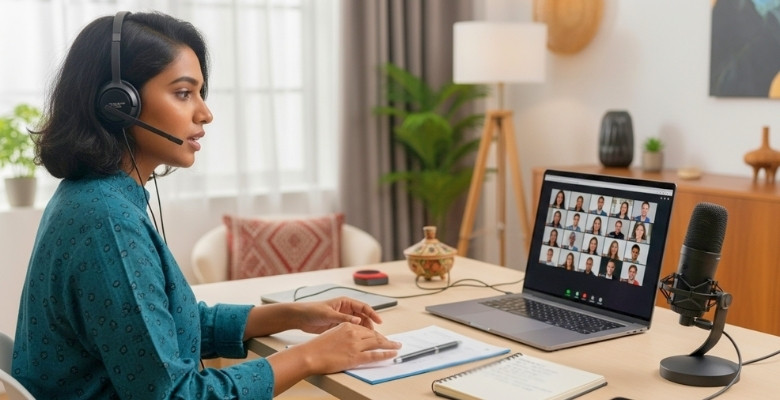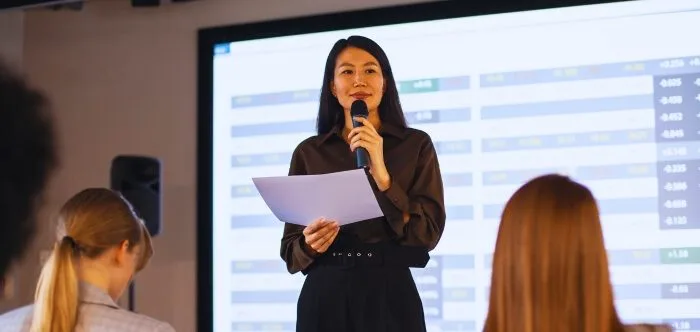Conferences bring together ideas, voices, and knowledge, but what keeps everything running smoothly is often less visible. Behind every well-timed session and engaging discussion is someone quietly guiding the process, the moderator. Their role is to create order while keeping energy alive.
So, what does a moderator do at a conference? In simple terms, they frame the session, introduce speakers, guide conversations, and make sure the audience feels involved. They are the person who ensures sessions don’t drag on, discussions stay focused, and everyone gets a fair chance to share their views.
A moderator’s presence can be the difference between a session that feels scattered and one that flows smoothly. With careful preparation, good communication, and a calm hand in the moment, they keep the spotlight on the content and the speakers. In the following sections, we’ll explore the details of their responsibilities and why their work matters so much.
What Does a Moderator Do at a Conference?
A conference moderator is the person who keeps everything running smoothly. They set the tone by framing the topic, introducing speakers, and outlining what the audience can expect. In academic and professional conferences, their role becomes even more important, as they manage time, guide discussions, and balance airtime across different voices. At the end, they close with key takeaways, next steps, and thanks – ensuring the session feels organized and valuable.
Quick Checklist of a Moderator’s Role
- Frame the session and set expectations
- Introduce speakers effectively
- Manage time throughout the session
- Guide discussion and audience engagement
- Run Q&A smoothly
- Handle challenges or disruptions
- Wrap up with clear takeaways
Frame the Session and Set Expectations
At the very start, conference moderators establish the purpose and flow of the session. They briefly outline what the audience can expect and why the topic matters. By setting expectations early, they create focus and prepare everyone for the journey ahead, ensuring attention is directed from the start.
Introduce Speakers Effectively
A good introduction goes beyond listing names and titles. The moderator highlights why each speaker is valuable to the discussion, giving the audience a reason to listen. This sets a positive tone, respects the speakers, and builds a bridge of credibility between them and the attendees.
Manage Time Throughout the Session
Timekeeping is one of the moderator’s most critical responsibilities. They ensure each speaker gets their allotted slot and that discussions don’t overrun. By using cues, gentle reminders, and tools like timecards, moderators maintain pace, keep the agenda intact, and respect the audience’s schedule.
Guide Discussion and Audience Engagement
Moderators act as facilitators, making sure conversations are balanced and meaningful. They prompt speakers with thoughtful follow-ups, link ideas between panelists, and invite the audience to engage. This guiding hand keeps the discussion inclusive, prevents domination by one voice, and ensures all perspectives are represented fairly.
Run Q&A Smoothly
During Q&A, moderators select and frame questions so they remain relevant and constructive. They make sure different voices are heard, prevent off-topic tangents, and balance time so multiple questions are covered. This ensures the session feels interactive while still staying focused and valuable.
Handle Challenges or Disruptions
Unexpected issues are part of live events – technical failures, over-talkative speakers, or difficult questions. A skilled moderator remains calm, addresses the situation directly, and redirects attention smoothly. Their ability to adapt and problem-solve in the moment protects the session from losing its flow or energy.
Wrap Up With Clear Takeaways
At the close, moderators summarize the key insights shared, thank the speakers, and point the audience toward resources or next steps. The role of a moderator in conference settings goes beyond just ending politely; it’s about ensuring participants leave with clarity and a sense of value.
Moderator vs Emcee vs Facilitator (Quick Comparison)
These three roles are often confused, but each plays a different part in making an event work. Understanding the difference helps organizers pick the right person and helps audiences know what to expect. Let’s break it down with a simple comparison.
Moderator
A moderator focuses on guiding the conversation. They keep time, introduce speakers, ask questions, and make sure discussions stay balanced. Their main responsibility is ensuring the audience gets clear value from the session without things going off track.
Emcee
An emcee, or master of ceremonies, is the voice of the event. They welcome people, energize the room, announce what’s coming next, and keep the overall program flowing. Their role is more about energy and transitions than deep discussion.
Facilitator
A facilitator works more closely with the group itself. They guide activities, encourage participation, and help attendees work together toward an outcome. Their style is interactive, and they often focus on workshops or problem-solving sessions rather than formal panels.
Comparison Chart
| Role | Main Focus | Typical Duties | Best Fit For |
| Moderator | Guiding discussion | Timekeeping, speaker intros, Q&A, and balancing talk | Panels, debates, conference sessions |
| Emcee | Hosting the event | Welcoming guests, transitions, announcements | Large events, ceremonies, and celebrations |
| Facilitator | Driving group participation | Running activities, prompting teamwork | Workshops, brainstorming, training |
While all three roles involve leading an audience, their responsibilities are quite different. Knowing the distinction helps events run more smoothly and ensures the right person is placed in the right role.
Duties Before the Session
Before stepping onto the stage, a moderator’s real work actually begins. The preparation they do ahead of time makes the session smooth, engaging, and worth everyone’s time. Let’s look at what happens before the first word is spoken.
Align With Organizer (objectives, audience, non-goals)
Every conference has a purpose, and it’s the moderator’s job to understand it well. This means sitting with the organizer to confirm the goal of the session, the kind of audience expected, and what not to cover. Clear alignment avoids confusion later, whether you’re acting as a meeting moderator or handling a larger event.
Build the Run-of-Show (timestamps, owners, cues)
A good session runs on a clear plan. The moderator works with the team to draft a simple timeline showing who speaks when, how long each segment lasts, and what cues are needed. Having this roadmap prevents last-minute surprises.
Prepare Speaker Intros (one-line + why they’re here)
Long bios can make audiences tune out. Moderators prepare short introductions that share a speaker’s role and explain why they’re part of the session. A simple one-liner makes the speaker shine while keeping the energy moving.
Timekeeping & AV Plan (mics, timer, stage layout)
Before the session, the moderator checks the stage setup. Are there enough mics? Does the timer work? Where should the panel sit? Even small checks like this prevent awkward pauses or delays once the session begins.
Inclusive Language & Name Pronunciation (quick checklist)
Respect goes a long way. Moderators double-check how to pronounce names and decide on inclusive words when addressing the audience. Simple phrases like “friends” or “colleagues” make everyone feel welcome without singling out groups.
Pre-Session Outreach
Before going live, it helps to connect with the speakers. A short 15-minute call ensures everyone understands the format, the timing, and how Q&A will work. It’s also a chance to prepare seed questions in case the discussion needs a boost. A skilled event moderator uses this time to build trust so the panel feels comfortable and ready.
Moderator Checklist (PDF) Download
Skills You Need (Condensed from qualifications)
A good moderator brings certain skills to the table:
- Clear and confident communication
- Comfort with the session’s topic
- Good organization and time control
- Quick thinking under pressure
- Careful listening and note-taking
- A calm but engaging presence
Preparation may not be visible to the audience, but it’s the reason sessions flow well. By aligning early, checking details, and planning smartly, moderators set themselves and their speakers up for a successful conference experience.
Duties During the Session
When the session begins, the moderator’s presence shapes the whole experience. It’s not just about talking; it’s about setting the right tone, keeping everyone engaged, and making sure the time is used well. Many moderators also gain insight from observing how others work when they attend conferences that take place internationally, as these events show different approaches and styles. Let’s break down how this works in action.
Opening in 45 Seconds (goal, flow, Q&A rules)
The first words from the moderator matter a lot. In under a minute, they welcome the audience, share the goal of the session, and explain how the flow will go. A quick note on when and how Q&A will happen also sets the right expectations.
Efficient Intros (tight bios + relevance line)
Instead of long resumes, the moderator introduces each speaker with just their role and why they are here. This short but sharp approach saves time and tells the audience what value each speaker brings, making it easier to connect right away.
Cadence & Airtime (short round one; deeper round two)
A balanced discussion doesn’t happen by accident. Moderators set a rhythm by starting with short answers in the first round, then moving into deeper takes in the second. This way, every voice is heard, and the talk builds naturally instead of dragging.
Bridging & Follow-Ups (link points; brief responses)
Good moderators don’t just move from one speaker to the next; they connect ideas. They might say, “That links to what Sarah mentioned earlier,” then invite a short follow-up. This keeps the conversation flowing and makes the session feel connected and thoughtful.
Timekeeping in Practice (when to flash cards; when to step in)
Time is one of the trickiest parts. Moderators often use visual cues like cards or subtle signals to remind speakers. If needed, they step in politely to move things forward. The goal is to keep the schedule intact without making anyone feel rushed.
Mid-Session Pulse Check (hands, quick poll, app)
Some sessions need a little spark in the middle. A moderator can ask for a quick show of hands, run a simple poll, or even take one short audience comment. This small check keeps energy levels up and lets the audience feel included.
Closing in 60 Seconds (takeaways; next steps; thanks)
At the end, the moderator wraps up in a minute or less. They highlight two or three clear takeaways, thank both the speakers and the audience, and share what comes next in the program. This ending helps the session feel complete and valuable.
During a session, the moderator is the anchor – opening strong, keeping pace, encouraging balance, and ending with clarity. With these steps, they make sure the time spent feels worthwhile for both the speakers and the audience.
Running Q&A Without Chaos
Q&A sessions can either be the most engaging part of a conference or the part where everything falls apart. A moderator’s job is to keep things clear, fair, and on time while still letting the audience feel heard. Here’s how it can be done.
Collection Methods
Questions come in different ways, through microphones, written cards, or apps. A good moderator explains upfront how questions will be collected. They also repeat the question before passing it to the speaker, so the whole room hears it clearly. This small step makes a big difference.
Fairness & Rotation
To keep things balanced, moderators make sure not just one person gets all the attention. They may set a limit of one question per attendee and rotate across different parts of the room. Giving diverse voices a chance adds value for everyone in the audience.
Handling Multi-Part or Hostile Questions
Sometimes an attendee asks a long or difficult question. The moderator can reframe it into one clear version, give speakers a set time to respond, or put it on a “parked list” to follow up later. This keeps the discussion respectful and on track.
When to End or Move On
Q&A has to end at some point. A moderator might signal “last two questions” or use polite phrases like “let’s take one more before wrapping up.” Smooth transitions into closing remarks help the audience feel the session ended naturally, not abruptly.
A successful Q&A feels lively but never messy. By setting clear rules, rotating fairly, and knowing when to wrap things up, moderators keep the session both respectful and productive for everyone involved.
Handling Problems (Decision Paths)
Even the most well-planned sessions face surprises. Technical glitches, long-winded speakers, or unexpected audience moments can throw things off. A calm and prepared moderator of an event is the one who ensures these situations don’t break the flow. Here’s how to handle common problems with confidence.
Over-talking Panelist
Sometimes a speaker gets carried away. The moderator can politely thank them, then turn to another speaker or shift to the next point. Simple phrases like “let’s hear a quick thought from…” help redirect smoothly without embarrassing anyone.
Tech Failure
If slides don’t load or a mic cuts out, the moderator keeps things moving. They might invite a speaker to continue without visuals, repeat audience questions loudly, or adjust the flow until the issue is fixed. The goal is to stay calm so the audience stays relaxed as well.
Late Start or Overrun
Delays happen, but the moderator adjusts. They can shorten introductions, limit answers, or reduce the Q&A time to bring things back on track. The key is being fair to all speakers while still respecting the audience’s schedule.
Off-Topic Pivot
Sometimes a speaker or question drifts away from the subject. A good moderator gently steers it back by saying something like, “That’s interesting, but let’s stay focused on today’s theme.” It keeps the discussion relevant without shutting anyone down.
Accessibility Issues Noticed Live
Moderators also watch for signs that some people are left out. If an audience member struggles to hear, the moderator repeats the question. If slides are too small, they can summarize key points aloud. Small adjustments make a big difference for inclusivity.
Problems will always pop up, but they don’t have to ruin a session. A professional moderator handles these challenges with calm words, quick thinking, and fair adjustments, keeping everything running smoothly and protecting the experience for both the audience and the speakers.
Duties After the Session
A moderator’s work doesn’t end when the session closes. What happens in the hours that follow can shape how people remember the event. Simple follow-ups, quick reflections, and small checks can leave a lasting impression. Here’s what should happen after the applause.
Follow-Ups Within 24 Hours
Right after the session, it’s good practice to thank the speakers and share any promised materials with the organizer. Whether it’s slides, notes, or key discussion points, sending them quickly shows professionalism and helps organizers keep the event resources organized.
Audience Resources
The moderator can also point the audience toward helpful materials. This might include links to further reading, the next session in the program, or a recap of highlights. Giving attendees clear resources ensures the discussion doesn’t end the moment the session does.
Quick Review
Once the dust settles, the moderator should take a few minutes to reflect. What worked well? Which parts dragged? What could be cut or done differently next time? This self-check doesn’t take long, but it helps moderators improve with every event.
Metrics to Track
Some things are worth measuring. Moderators can note whether the room stayed full, how many people joined the Q&A, and what kind of feedback came in. These simple checks – retention, participation, and feedback scores- are easy ways to gauge the session’s success.
The job of a moderator continues even after the session wraps up. By sending resources, reviewing performance, and tracking simple metrics, they close the loop and set the stage for doing even better next time.
Virtual & Hybrid Moderation (Key Tweaks)
Moderating online or hybrid sessions isn’t the same as standing on a stage. There are delays, chat boxes, and remote audiences that need equal attention. A moderator has to make a few small tweaks to keep things smooth and fair. Let’s see how it works.
Virtual Moderation
When everything happens online, moderators need to control both the flow of the discussion and the digital tools. They set ground rules for speaking, monitor the chat, and remind speakers to stay brief because online attention spans are shorter.
Hybrid Moderation
In hybrid settings, the challenge is balancing the live room and the virtual audience. A moderator has to make sure remote attendees feel included, repeating questions from the room, checking the chat, and giving equal weight to both sides.
Comparison: Virtual vs Hybrid Moderation
| Aspect | Virtual Moderation | Hybrid Moderation |
| Audience Engagement | Polls, chat Q&A, hand-raise features | Balance between live questions and online chat |
| Time Management | Shorter, tighter responses to keep attention | Adjust the pacing so both audiences can follow |
| Speaker Coordination | Remind speakers about mute/camera discipline | Coordinate mic sharing and screen visibility |
| Inclusivity | Ensure chat questions are not overlooked | Repeat in-room questions for the online audience |
| Moderator Presence | Use voice and visuals to keep energy alive | Split focus between the stage and the virtual platform |
Virtual and hybrid formats demand extra attention, but with a few smart adjustments, moderators can keep both in-person and online participants engaged. Balancing the two sides fairly ensures no one feels left out, no matter how they’re attending.
Common Mistakes (and Quick Fixes)
Even experienced moderators can slip into habits that weaken a session. The good news is, most mistakes are easy to spot and fix once you know what to watch for. Here are a few common ones and how to handle them better.
Long Introductions
Reading out lengthy speaker bios can lose the audience right away. Instead, share a quick line on who the speaker is and why their voice matters in this session. A short and relevant intro feels sharper and keeps the energy moving.
Ignoring Time Signals
Some moderators hesitate to cut speakers short, and this leads to overruns. A simple fix is to use clear time signals or polite interjections. A quick “let’s keep it brief so we can hear from everyone” works well without offending.
Weak or Missing Closing
Ending with just “thank you” leaves people unsatisfied. A stronger close includes a quick recap of two or three key takeaways and a thank-you to both the speakers and the audience. This leaves the session feeling complete and purposeful.
Skipping Audience Engagement
Sometimes moderators stick only to the speaker’s talk and forget the audience. A quick poll, a show of hands, or taking a few questions can transform the energy in the room. It doesn’t take much — just a simple gesture that shows inclusion.
Letting One Voice Dominate
When one speaker or audience member takes over, the session feels unbalanced. A moderator can step in by saying, “Let’s get a perspective from someone else,” or directly inviting another speaker to add their thoughts. It keeps the discussion balanced and fair.
Mistakes are natural, but moderators who spot and correct them quickly can turn things around. With small adjustments, they can keep the session lively, respectful, and memorable for everyone involved. Anyone preparing to moderate a conference session should keep these quick fixes in mind to avoid common pitfalls.
Benefits of Being a Moderator (trimmed micro-section)
Moderating isn’t only about helping an event run well; it also comes with personal rewards. Stepping into this role builds skills, opens doors, and leaves you with a sense of real contribution. Let’s look at a few benefits that stand out.
Stronger Communication
Moderators practice clear speaking, active listening, and quick responses. These skills carry over into everyday work and build confidence in front of groups.
Networking Opportunities
Being on stage connects you directly with speakers, organizers, and participants. It’s a natural way to grow valuable professional relationships.
Leadership Experience
Moderating is about guiding people and keeping control of the room. It shows leadership, decision-making, and the ability to manage challenges smoothly.
Personal Satisfaction
Helping both speakers and the audience enjoy a meaningful session feels rewarding. There’s pride in knowing your role made the event a success.
The benefits of moderating go far beyond the conference itself. It’s a role that builds useful skills, grows connections, and offers a rewarding sense of impact.
Frequently Asked Questions
Conferences bring up many small details that people wonder about, especially after learning what a moderator does. Here are some common questions that can clear things up and give you extra insight into the role.
Do Moderators Need to Be Experts in the Topic?
Not always. A moderator should understand the basics, but their main job is to keep the conversation balanced and clear. Subject expertise is helpful, but strong listening and guiding skills matter more.
How Do Moderators Stay Neutral During Discussions?
Moderators stay neutral by giving equal attention to all speakers and not showing personal opinions. They use phrases like “let’s hear another view” to keep the balance. Neutrality helps maintain trust with the audience.
Can a Moderator Influence the Flow of Ideas?
Yes, but in a subtle way. They connect points, ask follow-up questions, and highlight useful insights without taking the spotlight. This gentle influence shapes the discussion while keeping focus on the speakers.
What Should Moderators Carry With Them on Stage?
A simple set of tools helps. Many moderators bring time cards, a notepad, a pen, and a clear agenda. Having these handy makes it easier to stay organized and confident on stage.
How Do Moderators Handle Nervousness Before a Session?
Feeling nervous is normal. Moderators often review their notes, take a deep breath, and remind themselves they are there to guide, not perform. With practice, confidence grows naturally with each event.
Is It Okay for Moderators to Add Humor?
Yes, as long as it fits the setting. A light comment or quick smile can relax the audience, but overdoing humor can distract from the purpose. Moderators should keep it natural and respectful.
Can Moderators Learn From Feedback?
Absolutely. Feedback from organizers, speakers, and even the audience helps moderators improve. Each session is a chance to note what worked well and what needs adjusting, making them better with every event.
Concluding Lines
Conferences succeed when the flow feels natural and the audience stays engaged. A moderator makes this possible by preparing early, managing time, and guiding speakers so that each session leaves a clear impression.
When asked, what does a moderator do at a conference, the answer is simple yet powerful: they connect people, ideas, and discussions in a way that feels structured but still engaging. Their presence ensures balance and fairness throughout the event.
The work may look smooth on the surface, but it requires focus, calmness, and skill. With the right moderator, a conference doesn’t just happen; it runs seamlessly and leaves participants feeling they truly gained value.

